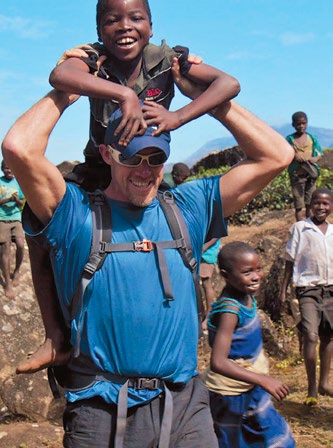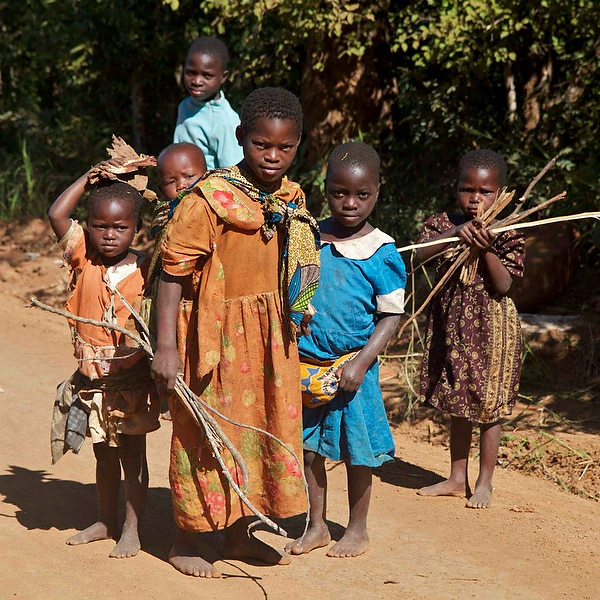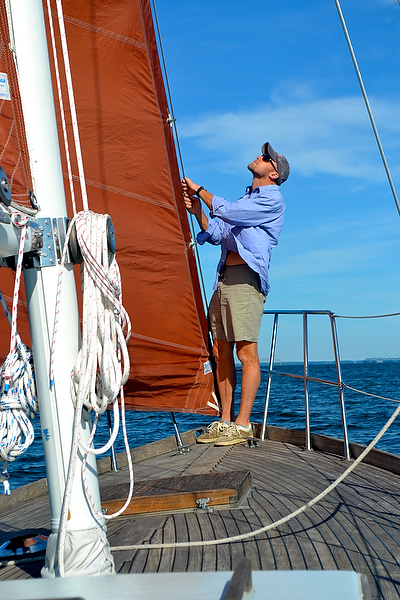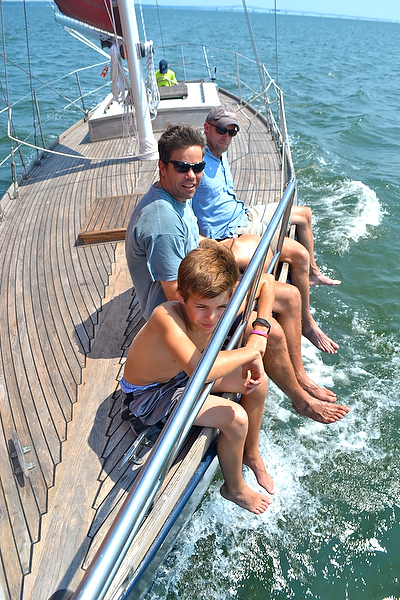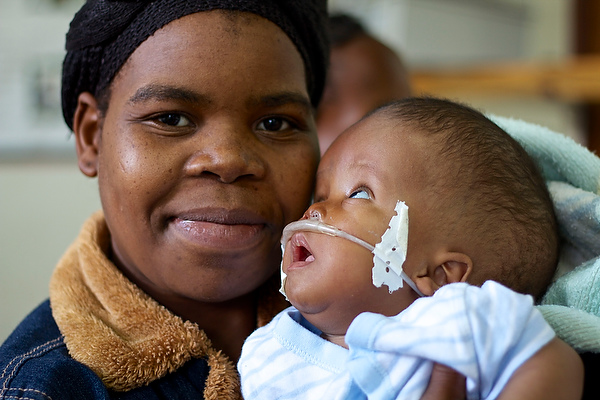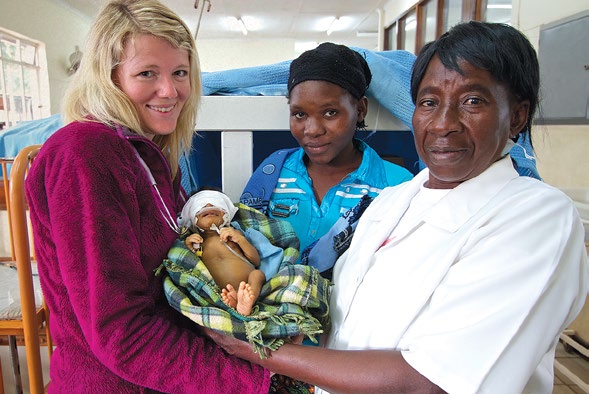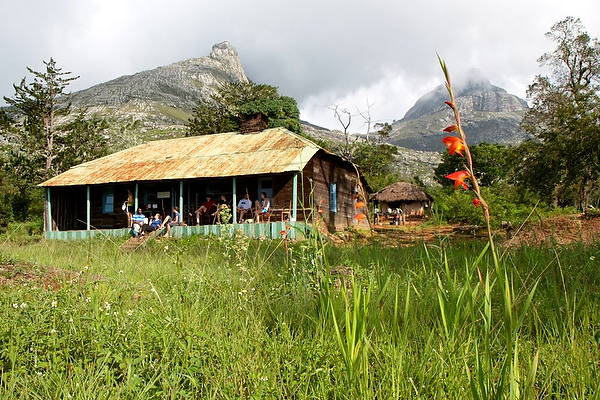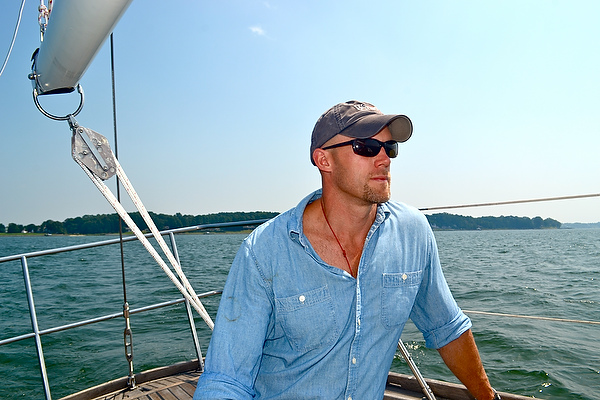In 1997, just a few years after graduating from Wake Forest, Rob Cocke was in a small cafe in a village near Lake Chirwa in Malawi. Playing a board game common there called bao and thinking about lunch, he wondered what time it was. An old man sitting near him had no idea; neither did the younger man next to him. Taking the problem as a challenge, they dispatched a boy to the nearby village, who returned to report that no one there knew what time it was either. Finally, a little girl arrived, carrying a watch — but the hands had long since rusted in place.
It is the perfect illustration of a place that to Rob seems to exist outside of time, at least time as we know it in the United States. That feeling has drawn the emergency room doctor back to Malawi repeatedly in a quest to live a life that’s one part Pro Humanitate, one part adventure. In Malawi, Rob says, he found “a place as real and as raw and as unpasteurized as any I have ever known.” Through his work in Malawi over the years, he has been struck by both the great need of so many of the people but also the overwhelming beauty in the simplicity of their lives.
Rob’s path to Malawi in one sense began while he was still at Wake Forest. He counts the friendships he developed there as among his greatest assets, in part because they inspired him to seek unique ways to serve. During summers, alongside some of those friends, he had worked as a leader on short-term mission trips to Mexico and Jamaica with a group called Son Servants. He learned “service was something that I enjoyed.”
Then, his junior year, he had no plans for spring break when a friend invited him to join a Habitat for Humanity service project building houses for needy families in West Virginia. “That week woke me up to what Habitat was doing, and I thought, ‘That’s fun, that’s a good thing.’ ” But he had no clear idea where it might lead.
With memories of those experiences and a healthy case of wanderlust, after graduation in 1993 he and three friends spent three months at Daystar University in Kenya, building a dormitory and a library in exchange for room and board.
It was at an ice cream shop in Kenya that Rob met someone working with Habitat for Humanity’s growing international program, and he discovered a way to combine his passions. By 1995 he had signed on for a three-year gig with Habitat, taking an open slot in Malawi.
Rob helped build simple, burnt-brick houses of about 500 square feet. He caught malaria. He accidentally put a knife through his cheek. He lost track of time.
Rob marveled at the people’s amazing outlook in the face of poverty. Malawi, he thought, had to be the most cheerful place on Earth. When the time came, he was more than a little reluctant to leave. “What I want most now is time, time to hide on this mountain just a little bit longer,” he wrote before his departure.
He composed that letter from Mount Mulanje, a favorite retreat when he wasn’t building houses. He grew so enamored of the place that he offered to rebuild a fallen hikers cabin near the top with help from the locals. And within a few years, he’d be back again.
RX FOR MEDICAL SERVICE
One of the most indelible, and perhaps unexpected, impressions Malawi left on Rob after that first trip was a deepening interest in medicine. He had halfheartedly pursued medical school after his experience in Kenya, but in Malawi he met doctors who became his heroes. “They were doing this positive work taking care of people. They were intelligent and worked hard but still had all of these outside interests far beyond the hospital. They were climbing and exploring.” He was bound and determined to emulate.
Rob made it into the Virginia Commonwealth University School of Medicine in Richmond and managed to arrange one short trip to Malawi as part of his training and a longer one after his residency.
In the United States, his medical career began and continues today at a hospital outside Staunton, Va., where he has a position as an emergency room physician and owns a home nearby — a former boarding house he remodeled himself with plenty of help from his family.
Ever inspired by his doctor heroes in Malawi, he also has pursued his cathartic interests outside of the hospital. He biked extensively and occasionally punished himself competing in Ironman or other endurance races. He took to sailing on the headwaters of the Chesapeake. After learning the ropes, he refurbished a 24-foot boat in his backyard in Staunton, much to his neighbors’ surprise since that backyard sits three hours from the coast. Later, he took a shine to a decaying 36-footer named Trilogy and spent months restoring it.
He found his work in Staunton to be a bit mundane. In contrast to the extreme need he had glimpsed in Malawi, more often than not, patients arrived in search of basic care rather than emergency services. Time seemed to be dragging on.
Longing for a literal and figurative departure, he signed on in 2012 for a one-year stint back in Malawi through a United Nations program. He’d be down to a twentieth of his Virginia salary, but he’d be returning now as an experienced doctor with more to give. The destination was the same hospital that had employed those early heroes of his, Queen Elizabeth Central Hospital in Blantyre, Malawi’s second-largest city. He would be the massive hospital’s sole emergency room doctor.
To mark the new beginning and his journey back to Malawi, in May last year he left Staunton and sailed Trilogy from Virginia to the Dominican Republic with friends. There the boat remains for now, under the care of a buddy he once worked with on the summer mission trips in Jamaica.
‘NO CONCEPT’ OF ER MEDICINE
Rob calls Queen Elizabeth’s hospital in Blantyre something of an enigma. It has its issues, he says, but still manages to care for a city of roughly 1 million people, and surrounding areas with millions more. Rob arrived less than a year after the hospital, with funding from a Scottish group, opened its first Accident and Emergency ward. Before that, emergency cases were handed off to various regular hospital departments, and patients often had to wait hours for critical care. “There was really no concept of emergency medicine, they just had the physical building,” says Rob. “The idea was to bring folks in to transfer knowledge.”
It was like practicing medicine in another time — before lawyers and sophisticated arsenals of body scanners. It was so different from the work Rob had been doing. “I was as good as a med student when I arrived,” he says. “Every day I was learning so much. The place made me a better doctor.” And he did his best to make some better doctors, too, working with numerous students from the medical school associated with the hospital.
There were countless cases of tuberculosis, and HIV/AIDS, along with brutal accidents like large trucks overturning while overfilled with riders. Resources were scarce. The work was in some ways more like the years he had spent working with his dad in the barn at their family’s small farm in Virginia than it was like his hospital in Staunton. You figured out how to fix the problem with what you had at hand.
“In Malawi you learn to think about patients; you learn more of the art of medicine,” he says. “You try something, and if it doesn’t work then you try something else.”
In most cases, the work is all or nothing, and supplies are limited. “There is simply a lot of sickness, and not a lot of fluff,” as Rob describes the difference between working in Malawi and back home.
Medicine and aid are complicated anywhere, but there are unique challenges in the developing world. Though there is a steady flow of money and resources coming into places like Blantyre and Queen Elizabeth, there is often corruption at multiple political and bureaucratic levels that leaves cupboards bare at the most critical times. “People die here for all sorts of reasons, many of them preventable and some just plain ridiculous,” he wrote home after a tough week.
The hospital would go days or weeks without tape or insulin or basic antibiotics. There might be no water because of a local strike or an ambulance crippled by a stolen battery. “I expect this is most likely just how the world works,” he says. “In Africa it is just that such things are easier to see.”
But there were small victories, too. A woman from an outlying area with a major head injury, whom he sneaked into the four-bed intensive care unit, survived. A man who lost his leg in an accident lived to thank the medical interns working with Rob who offered to buy the patient a prosthetic leg — something otherwise unaffordable.
And then there was the miracle of sugar. Caused by a number of problems, including malnutrition, hypoglycemia can lead to false medical calls in some parts of the world. It looks a lot like death but is easily remedied.
One glucose injection, and Rob seemed a hero, if not a miracle worker. “This can be a lot of fun,” he says. Once, he woke a man of 70 in front of some very amazed family members. When Rob came back a few hours later, the man said, “Zikomo, zikomo bwana. Ndili ndi mphamvu kwambiri.” (Thank you, thank you boss. I am with much power.) “Then the old man starts flexing his muscles like he is Charles Atlas or someone.” He grabbed Rob’s hand to shake it with both of his.
“The patients are the reason to be here,” says Rob. “They’re patient and they’re grateful and they’re tough. Taking care of those people is an absolute pleasure.”
Overall, Rob puts it like this: “You have some idea of what being a doctor would be when you go to med school and I don’t think I felt that at home. But here, this is what I thought it would be like.”
TIME FOR THE WILDERNESS
Though at home his long ER shifts were rewarded with two out of every four weeks off, the U.N. job in Blantyre typically provided Rob only two weekends a month to explore. But that was enough time to reach his favorite game park, where he and friends slept among elephants, impala, baboons and warthogs. He also made it back to Mount Mulanje and the cabin he built. “I go see that thing and I have no idea how we did that. It seems like a miracle every time,” he says. “I think that’s my favorite place in the world.”
Whether at work or play, he found amazing stories. Being in another country forces you to meet new and interesting people, but for Rob this is a magnified effect. At 6’2”, very white, and still looking something like the football player he was at Wake, Rob has always stood out in Malawi. During his earlier trips, young children sometimes yelled, “Schwarzenegger!” as he walked or biked past. Now, he jokes, they say he looks like a well known but aging French soccer player — except when they see him play. He got to know an elderly man living in a crumbling shack who drove the Rolls Royce limo for Malawi’s British governor before the country’s independence. He knows the expat expert on David Livingstone who has retraced the famed explorer’s steps through Malawi, and an aging Malawian Olympic boxer.
Nonetheless, after a year he was ready to make it back to Virginia, at least for a while, to see friends and families and return to the Staunton hospital — because in the United States time and medicine definitely do not stand still. “The biggest reason to come back is that I think if I spent too long practicing in (Malawi), it’s so different that I wouldn’t be able to practice medicine here safely or well,” he says.
Still a bachelor, Rob has some mobility. So, of course, he’s already thinking about ways to return. He might get involved with a training program in Malawi — to teach students the lessons he has learned — and move back and forth every six months or so. Or he might hook up with the British group that’s refitting an old steamship as a floating hospital that will run from village to village along the massive Lake Malawi, another favorite destination. “I don’t really think more than a week or two ahead,” he says. “But I’ve been trying to sort all that out.”
For now, he’s sorting out lessons learned. “I think what I’m finding is that it is easier to be truly compassionate for my patients there sometimes,” he admits, because the needs are so great and the “fluff” like legal matters and paperwork don’t get in the way. “I need to cultivate that compassion in myself here.” And for that, there’s still time.
Mark Schrope (’93) graduated with a BS in biology and roomed with Cocke for three years during college. Based in Florida, he writes for such publications as Nature, Popular Science, The Washington Post and Sport Diver.
